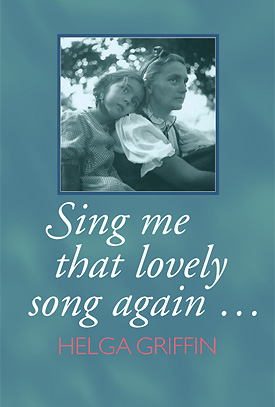
Sing me that lovely song again...
Helga Griffin
Pandanus Books 2006
|
|
|
Read extracts, Sing me that lovely song again...
‘In my memories, old Tehran lives, with its cobbled streets and the smell of urine in the gutters, a mixture of poverty and neglect and classy hotels. We sat in these on warm nights in rose gardens beside fountains, and ate delicious pink and white ice-creams from glass goblets on long stems. After one such outing, I became feverish and mother rubbed down my body with pure alcohol.
The Bazaar in Tehran was huge. Its arcades supported moulded ceilings that swept up to an opening through which light entered in shafts. Galleries ran in different directions. The place was always crowded, loud with people’s talk and the noises of animals, smelly, and very mushy underfoot. Mother bought vegetables and brass, bronze or silver utensils, as well as fabrics. But she also bought her produce from travelling vendors who announced themselves at the house door. Their donkeys were laden with polo (rice), bamia (okra) or baddenyan. I also saw fleet-footed carriers moving down the lane where we lived, delivering whole meals in stacks of white interlocking enamel pots. We ate sheep’s-milk yoghurt which had been set and sold in little baked clay ramekins. No milkman came and no milk was for sale…’

‘It was afternoon in Schimaran. Alone in the garden, I looked up to see a bi-plane doing acrobatics high up above our vacation house. The engine was purring as the plane looped. Now he was flying upside down, lying on his back. I watched with fascination, anxious for his safety way up there, but slightly cross at his stupidity. I felt how hard it would be to turn that metal bird back to its normal position.
Then I saw that he could not do it. Silence. A rattle. Deathly silence. The engine had cut out. Then smoke began to pour from the tail as the plane dived rapidly, making an eerie, whining sound. Would it fall into our garden and smash everything to pieces? I ran into the house, calling out. My parents were puzzled. They had heard the sound but had not associated it with an accident.
I pestered them to take me to the wreckage. But no-one was permitted to go to the site of the crash for three days. Father said that the man had been in the Iranian Air Force. Practising. When we were allowed to visit the site, we saw only bits of silver metal, too bright in the sun to look at. They were strewn far beyond our house, across a patch of scorched earth. The rest had been carefully cleared away.
I had waited with uneasy curiosity, thinking perhaps I might see a charred corpse. I had never seen anyone dead. I hoped madly I would see him. People were forever dying in children’s stories, and I wanted to know what it was like…’

‘Peter was intermittently sickly. At one period, all his teeth turned black and began to crumble; he had rickets. Occasionally both of us were infested with parasitic worms. They lay in wait in the dust and on the food we ate in public places. I had yellow jaundice for which my mother’s prescribed cure was vitamins from grapes and the exposure of the naked body to sunlight, accompanied by buckets of cold water poured over you in the open air, if in the privacy of the garden. Mother told me that the cure for tapeworm was to lure it out by pouring warm milk into a chamber pot. When this did not work, she was told to swallow a couple of tablespoons of petrol. Fortunately our children’s worms were less threatening.
One doctor commented that we were particularly susceptible to infections because mother kept us too clean.’
(from For the Love of Iran)
|

